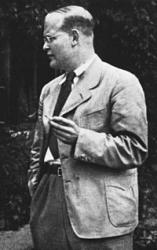Planning worship?
Check out our sister site, ZeteoSearch.org,
for 20+ additional resources related to your search.
- |
User Links
Person Results
Dietrich Bonhoeffer

1906 - 1945 Person Name: Dietrich Bonhoeffer, 1906 - 1945 Author of "Men Go To God" in The Hymn Book of the Anglican Church of Canada and the United Church of Canada Dietrich Bonhoeffer (German: [ˈdiːtʁɪç ˈboːnhœfɐ]; 4 February 1906 – 9 April 1945) was a German Lutheran pastor, theologian, anti-Nazi dissident, and key founding member of the Confessing Church. His writings on Christianity's role in the secular world have become widely influential, and his book The Cost of Discipleship became a modern classic.
See also in:
Wikipedia
Dietrich Bonhoeffer
Alfred M. Smith
1879 - 1971 Person Name: Alfred Morton Smith, 1879 - 1971 Composer of "SURSUM CORDA" in The Hymn Book of the Anglican Church of Canada and the United Church of Canada Alfred Morton Smith (1879-1971) was born in Jenkintown, Pennsylvania, and studied at the University of Pennsylvania (B.S. 1901) and Philadelphia Divinity School (B.D. 1905; S.T.B. 1911). An Episcopalian, Smith was ordained a deacon (1905) and a priest (1906). After a short time in Philadelphia and Long Beach, California, he served at St. Matthias Church, Los Angeles, for ten years. He was a chaplain in the U.S. Army during World War I, returning to Philadelphia in 1919, where he spent the remainder of his career. He retired in 1955. In 1963, Smith moved to Drium Moir, Chestnut Hill, Pennsylvania, and in 1968 to Brigantine, New Jersey, where he remained until his death.
--The Presbyterian Hymnal Companion, 1993
Alfred M. Smith
Walter Farquharson
b. 1936 Person Name: Walter Henry Farquharson Versifier of "Men Go To God" in The Hymn Book of the Anglican Church of Canada and the United Church of Canada Farquharson, Walter Henry. (Rosetown, Saskatchewan, May 30, 1936- ). United Church. University of Saskatchewan, B.A., 1957; B.D., 1961 (St. Andrew's College). His single pastorate (1961- ) has been a "tentmaker" ministry" at Saltcoats, Sask., which he combined with teaching English in the town's high school, and which he has from time to time shared with other clergy, notably Margaret Joyce Dickin. Many of his hymns have been set to music by Ron Klusmeier.
--Hugh D. McKellar, DNAH Archives
Walter Farquharson
William Henry Harris
1883 - 1973 Person Name: William H . Harris (I883-I973) Composer of "STONER HILL" in New Church Praise Sir William Henry Harris KCVO (28 March 1883 - 6 September 1973) was an English organist and composer, affectionately nicknamed 'Doc H' by his choristers.
Harris was born in Fulham, London and died in Petersfield. He was a chorister of Holy Trinity, Tulse Hill. At the age of 14, he took up a "flexible" position as Assistant Organist at St David's Cathedral in Wales, followed at 16 by a scholarship to the Royal College of Music where he was Professor of Organ and Harmony from 1921 to 1955. He was organist at St Augustine's Church, Edgbaston from 1911 to 1919 and concurrently of Assistant Organist at Lichfield Cathedral followed in 1919 by becoming Organist successively at New College and in 1929 Christ Church, Oxford, moving to St. George's Chapel, Windsor in 1933.
As Organist at Windsor, Harris was at his most productive. He produced music for the Three Choirs Festival, was a conductor at both the 1937 and 1953 coronations, and had music premiered at the Proms, all of which led to being appointed KCVO in 1954.
Harris is best remembered for his Anglican church music, though his main achievements were as a choir-trainer. His most famous works are the anthems "Faire is the heaven" (1925) and to a lesser extent "Bring us, O Lord God" (1959), both for unaccompanied double choir, and "Strengthen ye the weak hands" (1949) for choir and organ. His very accessible Communion Service in F was frequently sung in a great many Anglican parish churches up until the 1970s. The canticles Harris in A and Harris in A minor are still sung at Evensong in a number of Anglican cathedrals. He also composed cantatas and organ pieces, as well as the hymn tune Alberta (often used for the words "Lead, Kindly Light"), and various Anglican psalm chants.
--en.wikipedia.org/wiki/
William Henry Harris


 My Starred Hymns
My Starred Hymns


